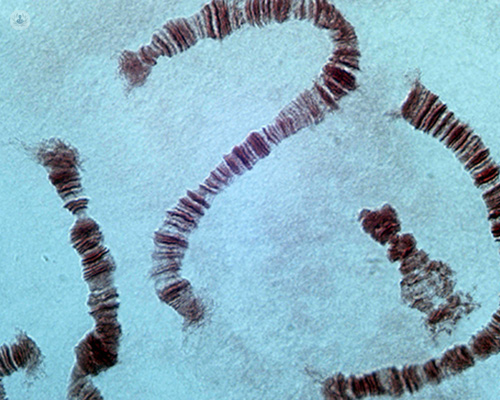Chromosomal abnormalities
Dr Melita Irving - Clinical genetics
Created on: 06-05-2018
Updated on: 04-19-2023
Edited by: Aoife Maguire
What are chromosomal abnormalities?
A chromosomal abnormality is an extra, missing, or irregular piece of chromosomal DNA, which makes up part of our genetic material. Many inherited diseases and specific traits are the result of chromosomal abnormalities or alterations. Certain chromosomal abnormalities may be visible or apparent at birth (birth defects) or can give rise to congenital conditions which develop over the course of time. Although there are many types of chromosomal abnormalities, they can be divided into two main groups:
- Structural abnormalities – the structure of a chromosome may be abnormal due to a deletion in part of the chromosome, a duplication in a section of the chromosome, an inversion (part of the chromosome breaks off and reattaches upside down), a translocation (one part of a chromosome transfers to another chromosome).
- Numerical abnormalities – when you are missing one of the chromosomes from a pair (e.g. Down’s syndrome).
Most abnormalities will occur in the sperm or egg, but some will happen after conception. They may be inherited or unique to that individual.

Prognosis of chromosomal abnormalities
It is important to note that often a miscarriage in an early stage of pregnancy will be because of a chromosomal abnormality in the foetus. Additionally, many babies born with certain chromosomal abnormalities will have a very low survival rate and will suffer from severe mental and physical disabilities. However, babies born with Down’s syndrome can have a healthy life expectancy, with healthcare assistance available to support them.
Symptoms of chromosomal abnormalities
The following are the more common forms of chromosomal abnormalities:
- Down’s syndrome
- Patau’s syndrome
- Edward’s syndrome (also known as trisomy 18)
- Turner syndrome
Medical tests to diagnose chromosomal abnormalities
Chromosomal abnormalities can sometimes be detected before birth, either via amniocentesis (analysis of a sample of amniotic fluid from the amniotic sac) or chorionic villus sampling (analysis of a sample of the placenta). Prenatal genetic testing is especially advised to older pregnant women, or couples with a family history of certain chromosomal abnormalities.
What are the causes of chromosomal abnormalities?
Chromosomal abnormalities result from a mistake in cell division (either mitosis or meiosis). However, there are certain factors that can increase the risk of chromosomal abnormalities forming:
- Environmental – certain factors in the environment could contribute to chromosomal abnormalities, but evidence for this is not conclusive.
- Maternal age – women who have children at an older age are more likely to have children with chromosomal abnormalities.
Can chromosomal abnormalities be prevented?
Whilst chromosomal abnormalities cannot be prevented, genetic counselling and prenatal testing can allow pregnant women to decide whether to continue their pregnancy if a dangerous chromosomal abnormality is detected.
Treatments for chromosomal abnormalities
Most chromosomal abnormalities do not have a treatment available.
Which type of specialist treats chromosomal abnormalities?
Obstetricians and clinical geneticists will perform prenatal testing, but treatment following birth will likely be multidisciplinary, including paediatricians, cardiologists and psychologists.


